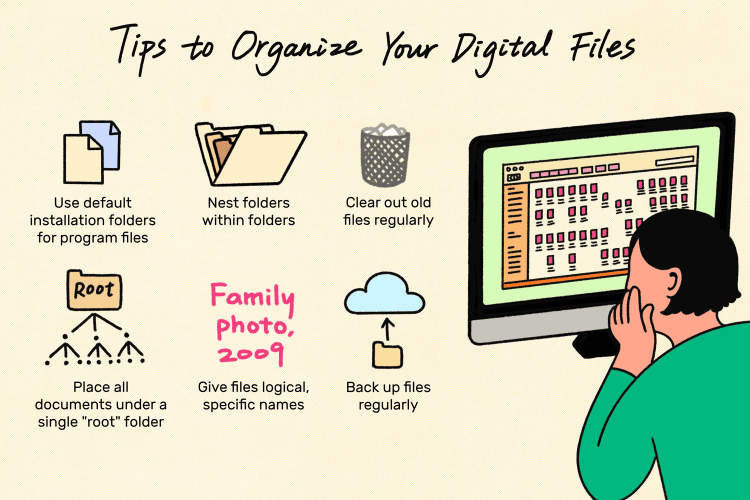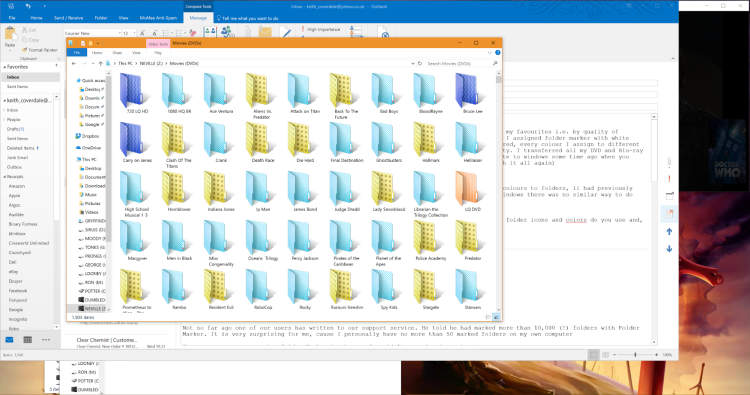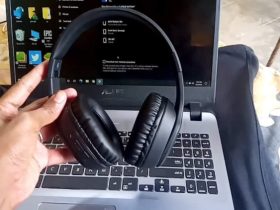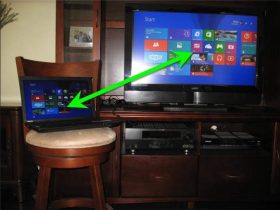For many people, organizing their files and folders on their laptop can be a difficult task. Not only can it be difficult to keep track of all your documents, photos, music and other types of files, but it can also clutter your Windows computer and make it harder to keep it running smoothly. This article will provide step-by-step instructions on how to effectively organize files and folders on your laptop.
Having an organized laptop will help you quickly find documents and files when you need them. It will help clear up clutter, keep your laptop better organized, and make it easier to back up your data or transfer it to another computer. Following these steps will help you get your laptop organized and keep it running smoothly.
Steps On How To Organize Files And Folders
Having an organized and easily accessible laptop files and folders is important for any individual. Not only does it make it easier and faster to find the files and documents you need, but it also prevents you from getting overwhelmed and stressed as you don’t have to search your entire laptop for what you need. To help you better organize your laptop files and folders, here are some effective steps you need to follow:
Step 1: Come up with an organizing system.
Start by creating a good system on how you want to store your files and folders. This is important not just so you don’t have a disorganized mess, but also so that you and others can easily find what they need. Depending on your needs, you can come up with categories such as “work projects”, “school assignments”, “personal documents”, “images”, and so on.
Step 2: Make use of folders.
Take it to the next step by putting your categories into folders. This can also help you come up with new categories if needed. Create folders that are related to what you will be storing in it. For example, if you have a category of “personal documents”, you might make separate folders for “personal finances” and “medical records”.
Step 3: Get your files in order.
Once you have your system and folders ready, the next step to effectively organize your laptop files and folders is to gather all your files and place them in the designated folders. This is a good way to know what files you have and what files you need. You can also delete or move the files you no longer need or want to reorganize.
Step 4: Manage your folder structure.
Organizing files in folders is a good way to start, but if you add too many folders, it can be difficult to manage. Having too many layers and sub-folders can also lead to confusion and disorganization. Before you add more folder layers, think about if they are really needed and if it can help increase your productivity. Another tip is to use easy to understand folder names as this can help you recall it more quickly and easily.
Step 5: Implement an archiving system.
Finally, establish an archiving system for older files that you don’t need immediate access to. This could be hard to do, especially if you can’t delete or move older files. To prevent cluttering of your laptop’s filing system, you can move the files to external hard drives, cloud-storages, or USB thumb drives so they’re easier to access when you need them.
Benefits Of Being Organized

Organizing your files and folders is a great way to keep your computer clean and running smoothly. Being organized and orderly will help you find documents, programs, photographs, video and music more quickly. It also helps you to minimize redundancy, create space and backup your important data without confusion and anxiety. Here are some of the benefits of being organized on your laptop.
Time Saving
Organizing files and folders means that you will find files more quickly and efficiently, which saves you lots of time. Spending time setting up a system that works for you and following it can also help you to save time in the long run. That way, you don’t have to worry about searching for files.
Minimization of Clutter
Clutter on your laptop not only takes up space, but it can also increase the risk of viruses and other security issues. Having a system allows you to quickly find, download, and delete files that you don’t need. You can also back up and store important files in an organized folder for easy access.
Regular Backups
Organizing files and folders also makes it easier to back up your data regularly. Having a system means that you don’t have to do it manually, as automated backups help to keep your data safe and secure. Regular backups are essential if you want to make sure your work and memories are safe and sound.
Systematic Retrieval
An organized system makes it easier to find, retrieve and move files from one location to another. You can easily create and store folders according to different categories and sub-categories. As a result, you can save yourself from a lot of time spent searching and moving files.
Better Organization
Organizing your files and folders is a great way to stay organized and on top of your projects. Having a system allows you to track your progress, make notes, keep deadlines, and manage information in an efficient and organized way. That way, you can focus on what’s important and get stuff done.
How To Keep Your Files And Folders Organized
Modern technology has made it easier than ever before to accomplish tasks quickly and efficiently. However, the sheer number of files and folders created when working on a laptop can quickly become overwhelming. To keep your documents organized, it’s important to be diligent about categorizing and labeling files. That way, you’ll be able to search for relevant information quickly whenever you need it.
Develop A Naming Strategy
You can save yourself a lot of time and frustration by using an organized system for labeling files and folders. Establish a naming strategy that will keep everything orderly and consistent. For example, use the same abbreviations for dates and titles, and create folders that are easy to search. Using a labeling system that reflects the logic of your work will make it simpler to find the files you need.
Categorize By Project
To make it easier to locate specific documents, try categorizing your folders by project. For example, create a folder for each major project and a subfolder for each associated task. That way, everything related to the project will be in one place, and you won’t waste time looking through unrelated files for what you need.
Utilizing Synchronization Tools
To make sure your folders and files are organized properly, consider using synchronization tools such as cloud services or an external hard drive. Services like Dropbox allow you to store all of your documents in the cloud so they can be accessed from anywhere. Alternatively, external hard drives are great if you need fast access to large files. Plus, with an external drive, you don’t have to worry about accessing the files on a different device.
Create A Filing System
To keep your files and folders organized in the long term, consider creating a filing system. This could involve physically organizing documents into folders or assigning a numerical code to each file and folder. Whatever system you choose, make sure to update it regularly, and consider purging any files that are no longer necessary.
Create A Backup System
Finally, it’s important to create a backup system to ensure that all of your files and folders are safe and secure. This could include backing up data to an external hard drive or using automatic backup services such as iCloud, Google Drive, or Dropbox. That way, if something goes wrong, you’ll have an up-to-date copy of all of your documents.
By following these steps, you can easily keep your files and folders organized and find the information you need quickly. With a little bit of effort, you can create an efficient system that will help you stay productive and organized.
Conclusion
Organizing files and folders on your laptop can be time consuming and tedious, but it’s worth it in the end. Taking the time to create a logical structure will make it easier to find documents and save time in the long run. A few simple steps can help make it simple: set up a system, create folders for different categories, avoid double filing, name files accurately and store related documents together. Finally, remember to keep your system up to date and manage your files regularly.
With an effective file and folder organization system in place, you will be sure to save time and have easy access to documents on your laptop. Setting up a process may involve a bit of work up front, but when done properly it can provide tremendous value to your productivity.






Leave a Reply